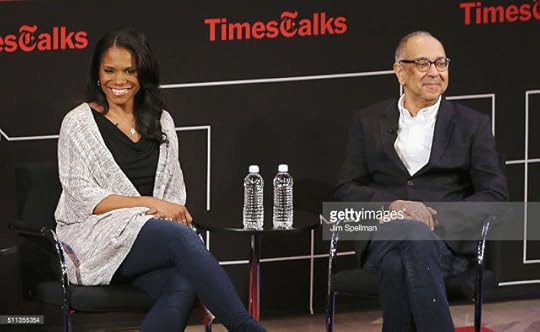Mark Anthony Neal's Blog, page 637
March 9, 2016
Jelani Cobb on His 'New Yorker' Essay Charting the Rise of Black Lives Matter
 NPR's Kelly McEvers spoke with Jelani Cobb, who has charted the genesis and evolution of the Black Lives Matter movement in his essay "The Matter of Black Lives" for The New Yorker.
NPR's Kelly McEvers spoke with Jelani Cobb, who has charted the genesis and evolution of the Black Lives Matter movement in his essay "The Matter of Black Lives" for The New Yorker.
Published on March 09, 2016 10:56
#TheRemix: The RZA on Hip-hop Chess + Black Lives Matter + Martin Shkreli
 On this episode of
#TheRemix
with James Braxton Peterson, The RZA talks about his work engaging young people in chess with the Hip-Hop Chess Federation, the controversial remarks he made in a Bloomberg interview about the Black Lives Matter movement, and the single-copy album The Wu — Once Upon A Time In Shaolin that sold to pharmaceutical mogul Martin Shkreli. Shkreli, who paid a reported $2 million for the album, was called to Capitol Hill to testify in a Congressional hearing after raising the price tag of the life-saving drug Daraprim 5,000%.
On this episode of
#TheRemix
with James Braxton Peterson, The RZA talks about his work engaging young people in chess with the Hip-Hop Chess Federation, the controversial remarks he made in a Bloomberg interview about the Black Lives Matter movement, and the single-copy album The Wu — Once Upon A Time In Shaolin that sold to pharmaceutical mogul Martin Shkreli. Shkreli, who paid a reported $2 million for the album, was called to Capitol Hill to testify in a Congressional hearing after raising the price tag of the life-saving drug Daraprim 5,000%.
Published on March 09, 2016 06:32
March 8, 2016
WUNC's The State of Things: Meet Yaba Blay
 'Growing up in New Orleans, Yaba Blay saw firsthand the different roles one navigates as an African-American. At home, she had to adjust to the Ghanaian culture of her parents, but outside the house, her dark skin set her apart from New Orleans' light-skinned Creole community. As Blay grew older, she began to explore how the ways in which she presented herself as a black woman defined her sense of self.
'Growing up in New Orleans, Yaba Blay saw firsthand the different roles one navigates as an African-American. At home, she had to adjust to the Ghanaian culture of her parents, but outside the house, her dark skin set her apart from New Orleans' light-skinned Creole community. As Blay grew older, she began to explore how the ways in which she presented herself as a black woman defined her sense of self. The author of (1)ne Drop: Shifting the Lens on Race (BLACKprint Press/2013), and a consulting producer for the CNN television documentary Who Is Black in America? Blay now serves as the Dan Blue endowed chair in political science at N.C. Central University in Durham. Host Frank Stasio talks with Blay about growing up in New Orleans and her multimedia work.'
Published on March 08, 2016 11:56
Donald Trump is the Presidential Candidate the Republican Party Deserves by Law Ware
 Donald Trump is the Presidential Candidate the Republican Party Deservesby Law Ware | @Law_Ware | NewBlackMan (in Exile)
Donald Trump is the Presidential Candidate the Republican Party Deservesby Law Ware | @Law_Ware | NewBlackMan (in Exile)After decisively losing in 2012 because of their inability to build bridges with people of color, Republicans were at an impasse. The question was: would they reach out to people of color and attempt to bring them into the fold . . . or would they continue their free-market assault and ignore that their voting bloc was shrinking? They choose door number three.GOP legislators redrew districts across the country in order to marginalize the black vote, and they enacted harsher voter ID laws making it harder for millions of people of color to cast their votes. The strategy was clear. If Republicans could not win over black and brown voters, they wanted to either keep them from voting or make their vote less impactful.Speaker of the House Paul Ryan held a press conference denouncing Trump after the GOP frontrunner refused to disavow former Ku Klux Klan leader David Duke. Ryan pontificated about the Republican Party’s disavowal of white supremacy. “Today I want to be very clear about something. . . If a person wants to be the nominee of the Republican Party, there can be no evasion and no games. They must reject any group or cause that is built on bigotry. This party does not prey on people’s prejudices. We appeal to their highest ideals. This is the party of Lincoln,” Ryan said.The only problem is that much of what he said is untrue.Yes, the GOP is the party of Lincoln. But since at least the days of Barry Goldwater, Republicans have had no problem using bigotry, often in subtle ways, to win elections. From their beloved Ronald Reagan’s use of the phrase “welfare queens” to the relentless disrespect President Obama has endured at the hands of party leadership, white supremacy is a well-established part of Republican Party political strategy.In 1981, political strategist Lee Atwater outlined a plan to consolidate white votes for the Republican Party. In a notorious interview, he explained:
You start out in 1954 by saying, “Nigger, nigger, nigger.” By 1968 you can’t say “nigger”—that hurts you. Backfires. So you say stuff like forced busing, states’ rights and all that stuff. You’re getting so abstract now [that] you’re talking about cutting taxes, and all these things you’re talking about are totally economic things and a byproduct of them is [that] blacks get hurt worse than whites. And subconsciously maybe that is part of it. I’m not saying that. But I’m saying that if it is getting that abstract, and that coded, that we are doing away with the racial problem one way or the other. You follow me—because obviously sitting around saying, “We want to cut this,” is much more abstract than even the busing thing, and a hell of a lot more abstract than “Nigger, nigger.”
Atwater’s version of the “Southern Strategy” deeply influenced Republican political discourse. In 1988, as George H.W. Bush campaigned against Democrat Michael Dukakis to replace Reagan, the National Security Political Action Committee released an ad intoning:
Bush and Dukakis on crime: Bush supports the death penalty for first-degree murderers. Dukakis not only opposes the death penalty, he allowed first-degree murderers to have weekend passes from prison. One was Willie Horton, who murdered a boy in a robbery, stabbing him 19 times. Despite a life sentence, Horton received 10 weekend passes from prison. Horton fled, kidnapped a young couple, stabbing the man and repeatedly raping his girlfriend. Weekend prison passes: Dukakis on crime.
While it never mentions race, the ad succeeded in manipulating white fears for political purposes. The ad changed history, helping propel Bush to victory andechoing in the Clinton administration’s “tough on crime” policies (even if Democrats publicly chastised Bush for the ad’s racist overtones during Clinton’s 1992 campaign).In keeping with Atwater’s strategy, Republicans have kept up their coded racist appeals throughout the Obama presidency. During the 2012 Republican presidential debates, Newt Gingrich called President Barack Obama the “food stamp president,” claiming that “more people have been put on food stamps by Barack Obama than any president in American history.” Not only is this statement misleading, it feeds off stereotypes about who receives these benefits.Yet it is the hypocrisy of Paul Ryan that I find most striking. In March 2014 Representative Paul Ryan (yes, the same man who claimed there was no place for white supremacy in the Republican Party), condemned the “inner-city values” of black people whom he implied are lazy. He further used the discredited research of Charles Murray as evidence for his claims. Paul Ryan is not above using coded language to stir racial animus—what Ian Haney Lopez calls “dog-whistle politics.” So why, now, should I believe his assertion that the “party of Lincoln” is not tinged with white supremacy?Donald Trump is the presidential candidate the Republican Party deserves. After years of stoking the fires of xenophobia, nationalism, and racism, they now have a frontrunner whose only brilliance lies in his ability to seize the populist anxiety Republicans themselves have cultivated. We are witnessing the implosion of a political party. It will take years for Republicans to recover from the disaster that is the 2016 election cycle, and they have no one to blame but themselves.On December 4, 1963, Malcolm X gave a controversial speech describing the assassination of John F. Kennedy as the “chickens of America coming home to roost.” You cannot sow seeds of destruction, he declared, and be surprised when violence is visited upon you. The same is true of the Republican Party. You reap what you sow.
This article first appeared in Dissent Magazine.
+++Lawrence Ware is an Oklahoma State University Division of Institutional Diversity Fellow. He teaches in OSU's philosophy department and is the Diversity Coordinator for its Ethics Center. A frequent contributor to the publication The Democratic Left and contributing editor of the progressive publication RS: The Religious Left, he has also been a commentator on race and politics for the Huffington Post Live, NPR's Talk of the Nation, and PRI’s Flashpoint. Follow him on Twitter: @law_ware
Published on March 08, 2016 05:46
March 7, 2016
"Visionaries Don't Get Blueprints"--Formation(s): Black Women + Politics + Desire
 A panel of Black women scholars + artists + activists discuss gender and sexuality politics in contemporary popular music and culture.
A panel of Black women scholars + artists + activists discuss gender and sexuality politics in contemporary popular music and culture. Panelists:
* Yaba Blay , author, producer and Dan Blue Endowed Chair and visiting professor at North Carolina Central University
* Joan Morgan , award-winning journalist and author of When Chickenheads Come Home To Roost
* Rapsody , Grammy-Award winning rap artist
* Eboni Marshall Turman , the director of Black Church Studies at the Duke Divinity School will moderate.
The event was sponsored by the Center for Arts, Digital Culture and Entrepreneurship (CADCE), Department of African and African American Studies, and the Duke Council on Race and Ethnicity (DCORE). #DukeFormation
Published on March 07, 2016 06:31
March 6, 2016
Tweet Talks Missy Elliott and Why ‘Charlene’ Was Worth the Wait
 'In a new exclusive interview with +The Boombox R&B star Tweet opens up about walking away from the industry.'
'In a new exclusive interview with +The Boombox R&B star Tweet opens up about walking away from the industry.'
Published on March 06, 2016 06:30
Anna Deavere Smith on James Baldwin
 'Tony-Award nominated actress and playwright Anna Deavere Smith joined +The Greene Space at WNYC & WQXR for an intimate conversation about her ground-breaking stage career, her creative process and what happens when theater and activism intersect. Here she discusses Margaret Mead and James Baldwin's historic conversation,
A Rap on Race
.'
'Tony-Award nominated actress and playwright Anna Deavere Smith joined +The Greene Space at WNYC & WQXR for an intimate conversation about her ground-breaking stage career, her creative process and what happens when theater and activism intersect. Here she discusses Margaret Mead and James Baldwin's historic conversation,
A Rap on Race
.'
Published on March 06, 2016 06:16
KING Me: Soul for a Black Future by I. Augustus Durham
 KING Me: Soul for a Black Futureby I. Augustus Durham | @imeanswhatisays | NewBlackMan (in Exile)
KING Me: Soul for a Black Futureby I. Augustus Durham | @imeanswhatisays | NewBlackMan (in Exile)I have been thinking a lot about whether Black History Month 2016 has been one of the most eventful in recent memory because it is a leap year. Occurring every four years, the last leap year—2012—was equally eventful because I was deciding what to do with my life, and that decision laid the foundation for me to even write this post. Nonetheless, in this moment of reminiscence, in order to capture what I feel is the essence of KING, I had to return to a closed rehearsal.
Closed rehearsals are intriguing in that they deal in secrecy, even though the eventual presentation will be quite public. Therefore, the recording of footage from a closed performance signals a kind of mediated fugitivity, i.e., it is an opportunity to show your work in order for it to possibly escape. I always think of this moment because according to Bishop Jerkins, although a closed congregation don’t get photographs, such presentations, and their publicizing, still edify “the body”.
And so, here is that “closed” rehearsal and below is what I think it means.
The February 5, 2016 release of We Are King has been heralded for some years now, especially for those who purchased the 2011 EP The Story. In a way, fans have edified themselves with those three tracks, and the intermittent release of this and this and this, for almost five years! A set of twins, Amber and Paris Strother, and Paris’s friend from Berklee, Anita Bias, officially crown themselves KING. The calculation of their releases over the past few years left people aurally salivating for what was next; an ever-burgeoning fan base, which the group is compassionate to acknowledge, young and old, and a consistently curated image made that first Friday in this 2016 Black History Month feel like Christmas.
The album is clean, pristine in fact! Including extended mixes of the EP tracks and the two previously released above, We Are King stakes a claim on bending genre and gender. The group’s mediated fugitivity is so deft at escape it is difficult to compartmentalize exactly what kind of music they sing.
The group website lists the genre as “dream-soul sound”, certainly an agreeable category. However, the cover of the album may offer a completely uncanny characterization: Eden-soul, a utopic sonicity manifested from women who have cultivated their aesthetic in a secret garden. Lush and equally layered, KING steps onto the music scene with this album and, a la James Weldon Johnson, decides, “We’re lonely—let’s make us a world!” In so doing, KING becomes “living soul”.
Couple this with previously unreleased records, such as “The Greatest”, which joins a recent pantheon of songs referential of gaming systems; “Red Eye” (a personal favorite!); and “Oh, Please!”, among others, and this debut concretizes itself as one of the most important LPs of 2016, a year that has only existed for two months.
At the same time that the group’s genre-bending is novel, the gender-bending is worthy of fleshing out precisely because, such manipulation might signal the Black Future. This is to say, Paris channels Stevie Wonder through the manner in which her fingers tickle ivory (she also sings!); Anita has a timbre and range that rivals any tenor, maybe even baritone, let alone an alto; and Amber’s clear-as-a-bell soprano has mimetic resonance with that of their mentor Prince.
All the while, they do not boycott their femininity because they are KING; in fact, that may be the very thing that makes them more royal—they adapt, when necessary, as interchangeable parts for the kingdom. What I mean is, I recently had a conversation discussing the best R&B girl group of the nineties; of course, I said En Vogue. One reason is because few groups of that era were capable of having every component of the outfit stand in front and sing lead . . . easily.
En Vogue did, and still does honestly, and KING may be a contemporary version-in-capability of En Vogue for a new generation of listeners interested in redefining what it means to be a funky diva. This only confirms the gender-bending because though they are KING, the aforementioned closed rehearsal in-sight permits listeners to recognize that KING can also invoke QUEEN named Nina, or Lorraine or Aretha, who provoke KING named Donny.
KING is the embodiment of what it means to be YOUNG. GIFTED. BLACK!
(Ain’t that sho nuff where it’s at?!)
Furthermore, along the lines of the religious and the linguistic respectively, the group does in fact become the metonym and the mass. On the one hand, the group aligns itself with what Joan Morgan recounts from Ms. Lauryn Hill—being black and divine—because like the hymn “Holy, Holy, Holy” states, they are KING in three persons, blessed Trinity. On the other hand, to title the album We Are King plays upon a capaciousness often found in African Diasporic Language (my linguistic frame is Zulu so here it goes): one manner in which to greet a person is to say “Sanibona!” which translated means “I see you!” The “-ni-” in the word signals the second person plural inasmuch as when said to someone, the phrase properly suggests, “I see you (all)”, an acknowledgment of the ancestors standing beside the person/s receiving the greeting.
Therefore, KING’s choice of album title, as well as the phrase’s use to greet and conclude the live show (as an aside: I saw KING Saturday, and it is as good live, maybe even better, as it is on wax), performs a stunning act: with the king being a singular figure, the album title and the group name proposes that even in the collective, WE ARE ONE. That forethought somehow situates Frankie Beverly & Maze as prophetic: that’s the way it is and, for that matter, the way it ought to be!
***
I. Augustus Durham is a third-year doctoral candidate in English at Duke University. His work focuses on blackness, melancholy and genius.
Published on March 06, 2016 05:34
March 4, 2016
TimesTalks: Audra McDonald + George C. Wolfe + The Revival of 'Shuffle Along'
 'Some of Broadway’s top talents are joining forces on one of the most anticipated shows of the season, a star–studded revival of the 1921 musical Shuffle Along, with music and lyrics by the legendary Sissle and Blake, a new book by George C. Wolfe, which is based on the original by F.E. Miller and Aubrey Lyle, and new choreography by Savion Glover. New York Times critic at large Wesley Morris talks with the show’s writer/director Tony Award winner George C. Wolfe and six–time Tony Award® winner Audra McDonald, who stars in the show alongside Brian Stokes Mitchell, Billy Porter, Brandon Victor Dixon and Joshua Henry.' -- +TimesTalks
'Some of Broadway’s top talents are joining forces on one of the most anticipated shows of the season, a star–studded revival of the 1921 musical Shuffle Along, with music and lyrics by the legendary Sissle and Blake, a new book by George C. Wolfe, which is based on the original by F.E. Miller and Aubrey Lyle, and new choreography by Savion Glover. New York Times critic at large Wesley Morris talks with the show’s writer/director Tony Award winner George C. Wolfe and six–time Tony Award® winner Audra McDonald, who stars in the show alongside Brian Stokes Mitchell, Billy Porter, Brandon Victor Dixon and Joshua Henry.' -- +TimesTalks
Published on March 04, 2016 21:32
Method Acting: 20 Years of Tical In Movies & TV
 A quick survey of some of Method Man's (Clifford Smith) movie and television roles over the last two decades. -- +WatchLOUD
A quick survey of some of Method Man's (Clifford Smith) movie and television roles over the last two decades. -- +WatchLOUD
Published on March 04, 2016 21:23
Mark Anthony Neal's Blog
- Mark Anthony Neal's profile
- 30 followers
Mark Anthony Neal isn't a Goodreads Author
(yet),
but they
do have a blog,
so here are some recent posts imported from
their feed.



